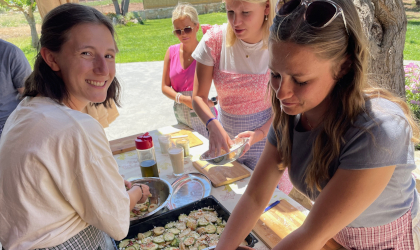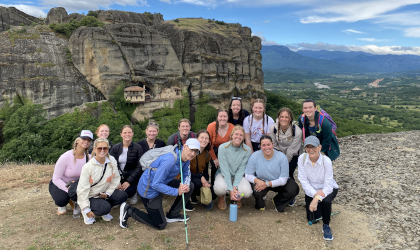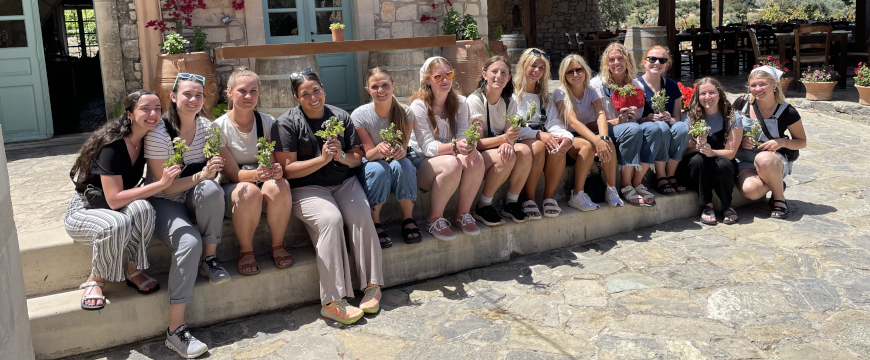Fourteen U.S. students have been exploring the Greek version of the Mediterranean diet and lifestyle and their health benefits on a three-week experiential learning trip in Greece. Part of the Global Health Internship program at Brigham Young University, this journey combines tourist cruises, hikes, and destinations with traditional activities and classes.

Titled “Eating, Cooking, and Living in the Mediterranean Way: Greek Islands,” this educational trip is led by Brigham Young University Public Health faculty Dr. Randy Page and Tana Page. Their journey around Greece features many activities related to traditional Greek cooking and food, in addition to outings focused on archaeology, agriculture, traditional crafts, history, religion, and the natural landscape.
Students from 13 different departments, from nursing, dietetics, and physics to family, religion, and English, have been touring mainland Greece and several islands. The group enjoyed a very busy first half of their trip. Starting with some of the well-known sites and foods of Athens, they proceeded to the astonishing clifftop monasteries of Meteora and a Greek Orthodox Easter celebration in Thessaloniki—two of their favorite parts of that segment of their trip.

Farther south, their exploration of the island of Crete included field trips to a re-creation of a traditional 17th-century farming village called AgrecoFarms, as well as the historic Arkadi monastery, the ancient olive tree of Vouves, and Terra Creta’s olive mill, with traditional food tastings, cooking classes, and other adventures interspersed.
Each of the 14 participating students is taking two of three academic courses that focus on the Greek diet and cuisine, mind/body, or culinary and lifestyle medicine. Having prepared for their trip with readings and assignments, the students will finish up with cooking projects and essays after the trip.
Greek Liquid Gold talked with the group at To Stachi vegetarian restaurant in Chania, Crete before they headed to the islands of Santorini and Naxos. Enjoying some of their favorite Greek foods (such as Greek salad, tzatziki, and briam) along with new discoveries, the students reflected on their adventures and their impressions of the Greek diet and lifestyle.
On this journey, Eliza Wright confided, “I don’t feel like a typical student. Usually I sit in a classroom and study. But here, I’ve done my learning through experiences, which has been a huge game changer for me. I feel immersed in the culture and people.” In Greece, Lauren Boswell feels “like a welcomed part of the community rather than merely a tourist or student. I’ve loved the culture and the Greeks’ love for their religion.”
Samantha Lewis noticed that meals often “bring families and groups of friends together for both preparation and consumption.” Sarah Major “loved seeing the way food is so imbued in culture and family, and I think it’s something that many developed countries could learn from.”
Lara Cassity observed that Greek food “is prepared with so much time and care and intent to gather and show love. It’s all so different from the isolated rush and pressure of United States living.” Kaela Fite similarly commented that Greeks “take the time to socialize with family, and even at restaurants they let us stay for as long as we want to continue to connect.”
Several students considered the traditional Greek version of the Mediterranean lifestyle in relation to classroom lessons about its mental and physical health benefits, for which they saw first-hand evidence on this voyage. The students believe Greeks realize that food is a way to relax, open up, communicate, and connect with family and friends. Pointing out that food is digested better when one is relaxed, and that people who eat together also tend to eat more vegetables and fruits than those who eat on the go, students understood the dietary benefits of the lifestyle.
With all of this in mind, a number of the students plan to adopt aspects of the Greek diet when they return to the U.S. As Hallee Kimber reported, “this trip has changed the way I will go home and eat. It has broadened my horizons and allowed me to have a new perspective. It has changed my mind on how food can change relationships for the better.”
Kiana Paulson intends “to continue to eat a lot of vegetables and also incorporate more fresh herbs.” Rachel Hart also plans to make changes: “First, I’ve learned good new ways to include more vegetables in my diet. Also, I have a new admiration for olive oil and its benefits in cooking and eating. Lastly, I want to try eating less meat.”
Teagan Spangler commented on “how light and fresh” the Med diet is. “All of the ingredients are so fresh and tasty, and even after eating a huge meal, you still feel light and healthy, not weighed down and bloated like with American food. I definitely will be using olive oil in everything from now on. It’s so good on everything.”
Like these American students, other visitors from various backgrounds can be inspired to embrace beneficial parts of the famously healthy traditional Greek diet and lifestyle for the sake of their well-being. At the same time, educational travel, lifestyle tourism, culinary tourism, and agrotourism can expand the scope and timeframe of tourism, extending its economic benefits into different parts of Greece throughout the year.
Combining experiential learning with alternative tourism, the Eating, Cooking, and Living in the Mediterranean Way: Greek Islands trip showcases several ways of sharing the wonderful cultural asset of the Mediterranean diet and lifestyle with international guests.
Thanks to Randy Page and Tana Page for the photos that appear with this article.
All businesses, organizations, and competitions involved with Greek olive oil, the Mediterranean diet, and/or agrotourism or food tourism in Greece, as well as others interested in supporting Greeks working in these sectors, are invited to consider the advertising and sponsorship opportunities on the Greek Liquid Gold: Authentic Extra Virgin Olive Oil website. The only wide-ranging English-language site focused on news and information from the Greek olive oil world, it has helped companies reach consumers in more than 220 countries around the globe.


